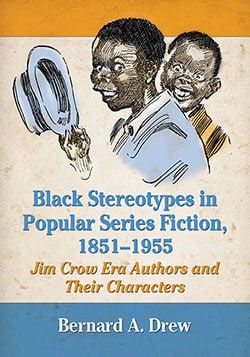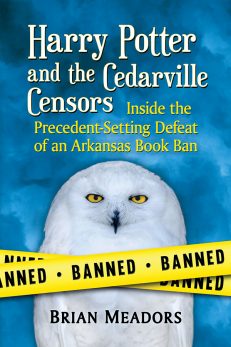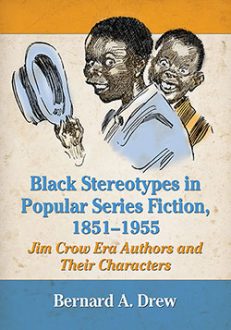Black Stereotypes in Popular Series Fiction, 1851–1955
Jim Crow Era Authors and Their Characters
$39.95
In stock
About the Book
Even well-meaning fiction writers of the late Jim Crow era (1900–1955) perpetuated racial stereotypes in their depiction of black characters. From 1918 to 1952, Octavus Roy Cohen turned out a remarkable 360 short stories featuring Florian Slappey and the schemers, romancers and ditzes of Birmingham’s Darktown for The Saturday Evening Post and other publications. Cohen said, “I received a great deal of mail from Negroes and I have never found any resentment from a one of them.” The black readership had to be satisfied with any black presence in the popular literature of the day.
The best known white writers of black characters included Booth Tarkington (Herman and Verman in the Penrod books), Irvin S. Cobb (Judge Priest’s houseman Jeff Poindexter), Roark Bradford (Widow Duck, the plantation matriarch), Hugh Wiley (Wildcat Marsden, the war veteran who traveled the country in the company of his goat) and Charles Correll and Freeman Gosden (radio’s Amos ’n’ Andy). These writers deservedly declined in the civil rights era, but left a curious legacy that deserves examination. This book, focusing on authors of series fiction and particularly of humorous stories, profiles 29 writers and their black characters in detail, with brief entries covering 72 others.
About the Author(s)
Bibliographic Details
Bernard A. Drew
Format: softcover (7 x 10)
Pages: 292
Bibliographic Info: 33 photos, notes, bibliography, index
Copyright Date: 2015
pISBN: 978-0-7864-7410-3
eISBN: 978-1-4766-1610-0
Imprint: McFarland
Table of Contents
Table of Contents
Preface 1
Introduction: If That Is the Way They Are in Stories,
That Must Be the Way They Are in Life 4
I. Writers of the Antebellum, Reconstruction
and Early Jim Crow Era (1851–1899) 19
Harriet Beecher Stowe (1811–1896) 20
Mark Twain (1835–1910) 23
Joel Chandler Harris (1848–1908) 25
George Washington Cable (1844–1925) 29
Thomas Nelson Page (1853–1922) 30
Charles W. Chesnutt (1858–1932) 32
Paul Laurence Dunbar (1872–1906) 35
II. Writers of the Late Jim Crow Era (1900–1955) 37
Richard F. Outcault (1863–1928) 37
Henry Edwards Cowen (“Red Buck”) Bryant (1873–1967) 45
Bridges Smith (1848–1930) 49
Harris Dickson (1868–1946) 71
Irvin S. Cobb (1876–1944) 77
E.K. (Eldred Kurtz) Means (1878–1957) 88
Booth Tarkington (1869–1946) 96
James P. Alley (1885–1934) and Calvin Alley (1915–1970) 106
Ambrose E. Gonzales (1857–1926) 113
Robert McBlair (1888–1976) 118
Octavus Roy Cohen (1891–1959) 122
Harry Stillwell Edwards (1855–1938) 159
Arthur LeRoy Kaser (1890–1956) 164
Hugh Wiley (1884–1968) 170
Arthur K. Akers (1886–1980) 179
Roark Bradford (1896–1948) 183
Charles Correll (1890–1972) and Freeman F. Gosden (1899–1982) 199
Paul F. Ernst (1899–1985) 215
Will Eisner (1917–2005) 218
Langston Hughes (1902–1967) 228
III. Additional Writers of Interest 244
Phillis Wheatley (1753–1784) 245
Robert Roberts (1780–1860) 245
Thomas D. Rice (1808–1860) 245
John Pendleton Kennedy (1795–1870) 246
George Washington Dixon (1801–1861) 246
Augustus Baldwin Longstreet (1790–1870) 247
Caroline Gilman (1794–1888) 247
Lydia Maria Child (1802–1880) 247
Frederick Douglass (1818–1895) 248
William Wells Brown (1814–1884) 248
E.D.E.N. Southworth (1819–1899) 249
Mary Henderson Eastman (1818–1887) 249
Maria J. McIntosh (1803–1878) 250
Caroline Lee Hentz (1800–1856) 250
Mary J. Holmes (1825–1907) 250
Thomas Chandler Haliburton (1796–1865) 251
Johnson Jones Hooper (1815–1862) 251
Martin Delany (1812–1885) 251
Harriet E. Wilson (1825–1900) 252
Harriet Ann Jacobs (1813–1897) 252
Petroleum V. Nasby (1833–1888) 253
Samuel W. Small (1851–1931) 253
Irwin Russell (1853–1879) 254
Thomas Worth (1834–1917) 254
Colonel Prentiss Ingraham (1843–1904) 255
Louise Clarke Pyrnelle (1850–1907) 255
Katherine Sherwood Bonner McDowell (1849–1883) 256
Ruth McEnery Stuart (1849–1917) 256
Frances Ellen Watkins Harper (1825–1911) 256
Polk Miller (1844–1913) 257
John Trotwood Moore (1858–1929) 257
Kate Chopin (1851–1904) 258
Opie Pope Read (1852–1939) 258
Bob Cole (1868–1911) 259
Miss Howard Weeden (1846–1905) 259
Martha Sawyer Gielow (1860–1933) 260
Helen Bannerman (1862–1946) 260
Alice Dunbar-Nelson (1875–1935) 261
Will N. Harben (1858–1919) 261
Booker T. Washington (1856–1915) 261
Martha Strudwick Young (1862–1941) 262
John Charles McNeill (1874–1907) 262
Frederick H. Seymour (1850–1913) 262
James D. Corrothers (1869–1917) 263
W.E.B. Du Bois (1868–1963) 263
Ella Middleton Tybout (1871–1952) 264
Silas Xavier Floyd (1869–1923) 264
William Marriner (1873–1914) 265
John F. Dixon Jr. (1864–1946) 265
Sara Cone Bryant (1873–?) 266
Frances Boyd Calhoun (1867–1909) and Emma Speed Sampson (1868–1947) 266
Joseph S. Cotter, Jr. (1861–1949) 267
James Weldon Johnson (1871–1938) 267
Marion F. Harmon (1861–1940) 268
B.B. Valentine (1862–1919) 269
Julia Mead Peterkin (1880–1961) 269
Robert Emmet Kennedy (1877–1941) 269
Jane Baldwin Cotton (d. 1932) 270
Nella Larsen (1891–1964) 270
Charles E. Mack (1887–1934) 271
Annie Vaughan Weaver (1905–1982) 271
Inez Hogan (1895–1973) 272
E.V. White (1879–1955) 272
Zora Neale Hurston (1891–1960) 272
Richard Wright (1908–1960) 273
Ellen Tarry (1906–2008) 273
Enid Blyton (1897–1968) 274
Jackie Ormes (1911–1985) 274
Ralph Ellison (1914–1994) 275
James Baldwin (1924–1987) 275
Lorraine Hansberry (1930–1965) 275
Index 277
Book Reviews & Awards
Winner—ALA Outstanding Reference Source
“Valuable reference source…highly recommended”—American Library Association; “informative and extremely useful…recommended”—ARBA; “Drew explores the way white fiction writers wrote about black characters in the Jim Crow era”—ProtoView.






